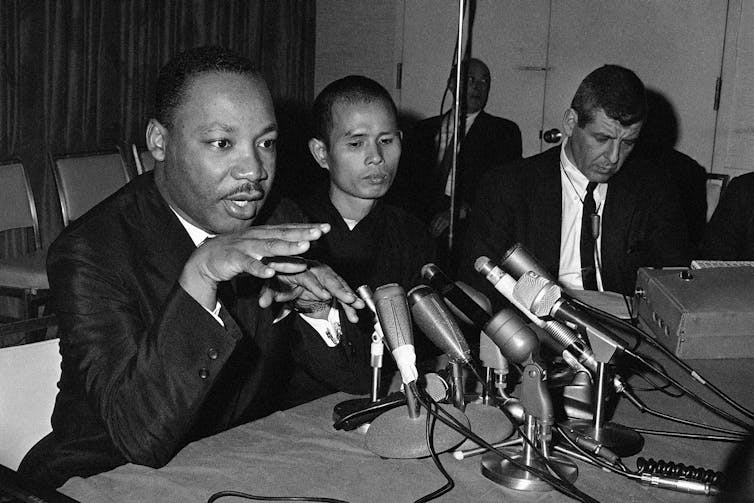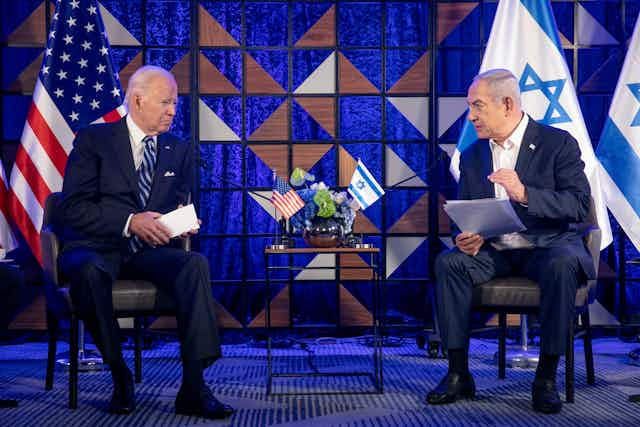When big questions about American foreign policy collide with an election, it’s rarely good news for a sitting president.
Like many leaders before him, US President Joe Biden has had some of these questions thrust on him, such as Russia’s invasion of Ukraine. Some have their origins in past administrations, such as the withdrawal from Afghanistan. Most are a mixture of both, such as Israel’s retaliation against Gaza and the role of Iran.
Given the magnitude of these intersecting crises and the fact they are happening during a fraught election campaign, it’s not surprising Biden’s foreign policy is subject to intense scrutiny.
So how might this administration’s foreign policy influence voters’ decision-making in November?
Back to Afghanistan
Many analysts trace the start of Biden’s foreign policy troubles to what is often described as the “botched” American withdrawal from Afghanistan. In isolation, and despite the entirely avoidable tragedy that has unfolded there, Afghanistan alone is unlikely to have made an electoral impact beyond the hand-wringing of some political pundits.
That is not necessarily the case with the other global crises that now grip the Biden administration – especially its response to Gaza.
It is notoriously difficult to predict voter intention, especially this far out from election day. But a look at the history of the impact of international problems on voter intention in elections can help us understand how Americans think about their role in the world, and the influence that might have on their choice of leader this time around.
Read more: Biden's burden: four percentage points, a struggling economy and a fragile democracy
1968 redux?
This year, the Democratic National Convention returns to Chicago, Illinois. Given the startling parallels between this year and 1968 – when the convention was also held in Chicago – the decision to return to the Windy City seems ominous.
In 1968, foreign policy was at the forefront of several serious and intersecting crises in American democracy.
Reeling from the assassinations of Martin Luther King junior and the leading candidate for the nomination, Robert F. Kennedy, the violent backlash to the civil rights movement, and an escalating war in Vietnam, the Democratic Party went to Chicago in crisis.

Anti-war protesters, horrified by American involvement in Vietnam, convened in Chicago hoping to influence the outcome of the nomination process. The convention descended into chaos and violence, much of it committed by police, who arrested 650 protesters.
The Democratic nominee, incumbent Vice President Hubert Humphrey, went on to lose the election to Richard Nixon.
Though the history and context of the United States’ role in the Middle East is vastly different from that of Vietnam, there are important domestic parallels.
As with Vietnam, today’s Democratic Party is riven by division over the Biden administration’s response to Gaza. In the Michigan state primary in February, more than 100,000 Democrats voted “uncommitted” as part of a co-ordinated campaign to send a message to Biden, demanding he do more to stop the slaughter of Palestinians in Gaza. In the 2020 election, Biden won Michigan by just over 150,000 votes.
The ongoing, peaceful disruption of Democratic campaign events by protesters is likely to continue and extend to the convention in August. Dissent is critical to the health of democracies, but media coverage will surely not frame protests in that way. Intra-party division is likely to be presented negatively. That coverage will continue to shape broader perceptions of the strength and endurance of Biden’s leadership.
Iran
Iran, too, has played an outsized role in past American elections. Given the events of the past week, it may well do so again.
Conventional wisdom suggests the 1979 Iranian Revolution and the botched handling of the subsequent Iranian hostage crisis inflicted one of the most humiliating defeats of modern American history on incumbent Democratic President Jimmy Carter.
A year before the 1980 election and in the midst of the Iranian Revolution, militant students seized the American embassy in Tehran and held more than 50 Americans hostage. The crisis dragged on for over a year, watched on by seemingly helpless American officials. An abortive military rescue operation was a disaster.
Combined with the revolution itself and the Soviet invasion of Afghanistan in December 1979, Carter’s authority was weakened beyond repair.
His Republican challenger, Ronald Reagan, successfully exploited Carter’s weaknesses, promising to “make America great again”.
Like Humphrey in 1968, Carter lost in a landslide. The hostages were released on the day of Reagan’s inauguration.
That timing was not a coincidence. Conventional commentary about Carter’s apparent weakness often fails to note that, after the failed rescue attempt, the Carter administration engaged in protracted, contentious negotiations with Iran right up to the dying day of his presidency. It was those negotiations that ultimately resulted in a deal to release the hostages. Significant questions remain about the Reagan campaign’s role in the resolution of the crisis.
Perceptions matter
The historical details of these foreign policy crises are important. But in terms of election outcomes, how they are perceived and mythologised matters more.
Carter’s legacy, and particularly perceptions of his weakness, are now being significantly revised. But as events were playing out, perceptions of Carter’s ineptitude, his central role in a developing sense of American “malaise” and Reagan’s ability to cultivate a contrasting image of strength and vitality lost Carter the election. Just as in 1968, that loss dramatically reshaped the United States’ role in the world and the course of global history.
Like Reagan after Carter, Biden promised to restore America’s role as a force for good in the world after four chaotic years under Donald Trump. He reassured Americans the “beacon” of American global leadership could be relit.
The risk for Biden is that he has not anticipated just how much his own foreign policy might undermine that message and the strength of his personal appeal.
Polling suggests around two-thirds of Americans support an immediate ceasefire in Gaza. Biden’s political inability and personal unwillingness to distance the United States from Israel, and his administration’s ongoing refusal to put conditions on military aid, is breaking apart the loose voting coalition that brought him to power. He will need this coalition to hold, and to turn out to vote, if he is to win re-election.
More broadly, perceptions of Biden’s lack of empathy for the suffering of the Palestinian people, particularly children, risks catastrophically undermining the deeply personal image of a compassionate, generous man that he has so carefully cultivated. That image was central to his appeal to voters in 2020.
Taken together, this means the incumbent president faces a kind of pincer movement.
On the one side, Biden appears to be presiding over a crisis in American moral leadership. The “international rules-based order” he promised to uphold is, in the eyes of many Americans, being unevenly applied to America’s allies.
On the other, Trump, Biden’s opponent again, seeks to exploit perceptions of his weakness and vulnerability to project a contrasting image of uncompromising strength. It is an image that appeals to a Reagan-like framing of an America that must be restored to its rightful position of unrivalled global dominance.
Read more: Should world leaders worry about another Trump presidency?
The sense that the Biden administration has lurched from one foreign policy crisis to another only reinforces this narrative. There are also concerns its foreign policy team appears to be focused on “wins” and “losses” rather than understanding and addressing the underlying, structural factors that caused those crises in the first place.
Fairly or not, the cumulative result, combined with other issues such as shifting perceptions of the domestic economy, is a very low personal approval rating for the president.
Bad perceptions are mutually reinforcing. And when current polling – inadequate as it may be – suggests a gap between candidates that is within the margin of error, perceptions matter a great deal.

